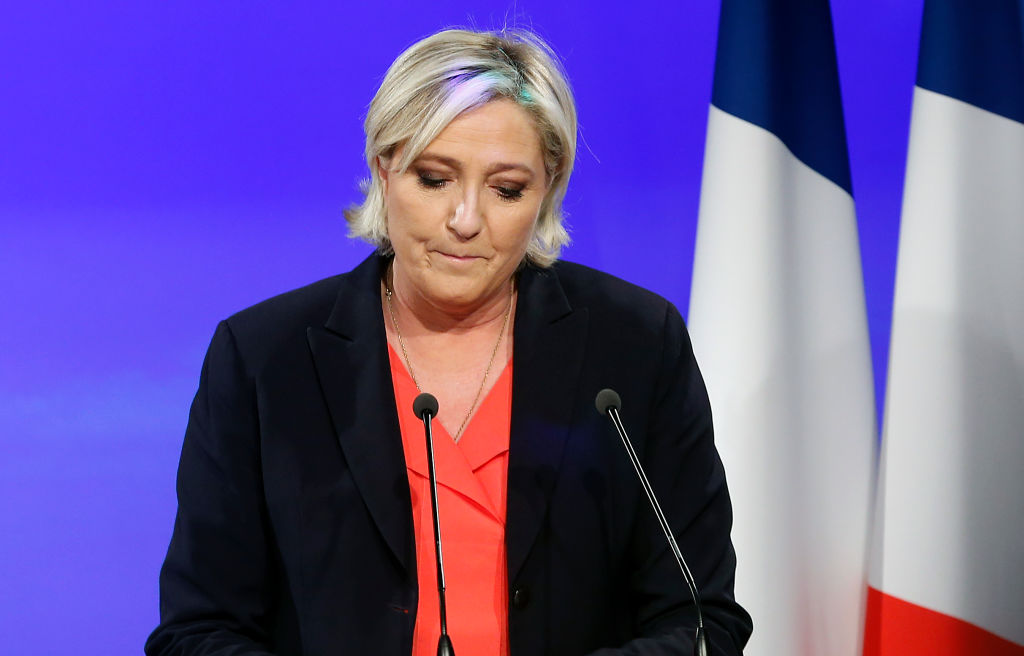So what now for Marine Le Pen and the National Front? On an evening when the party polled a record number of votes in a French election, twice as many as when they reached the second round in 2002, there was little sense of triumph away from the cameras. ‘There’s obviously a bit of disappointment, it would be dishonest to say otherwise’, said Marion Maréchal-Le Pen, niece of Marine. She had said last week that 40 per cent of the vote would represent a significant victory for the National Front but their final share of 34 per cent fell some way short of that figure. ‘We’ve clearly not succeeded to convince the French that this was a referendum for or against France, for or against mass immigration’, said Marechal-Le Pen, ‘and evidently these things will make us reflect in the weeks to come’.
Marechal-Le Pen dismissed suggestions that she might lead a putsch against her aunt following the disappointing results, saying that ‘she strongly rejects all media attempts in the coming days that would pit me against Marine Le Pen’. Such a move would be unwise before next month’s legislative elections, where the National Front have set a target of forty seats in the National Assembly, but one step that might be taken between now and then is the removal of Florian Philippot. The vice-president of the party, Marine Le Pen’s right-hand man, is a divisive figure. It was he who persuaded Le Pen to campaign more on leaving the euro and protectionism than focusing on the National Front’s traditional policies. A mistake in the eyes of Marechal-Le Pen and her grandfather, Jean-Marie, who founded the party more than forty years ago. Speaking to a French radio station on Sunday evening, Jean-Marie Le Pen regretted that the National Front had listened to Philippot, a man who should ‘retire into the background’, and he advised the party to returns to its ‘fundamentals’ such as its anti-immigration policy.
In accepting defeat on Sunday evening, Marine Le Pen declared that in spite of the margin of Macron’s victory a new fault line had opened up ‘between patriots and globalists’. To capitalise on what she described as this ‘historic opportunity, Le Pen suggested ‘we begin a profound transformation of our movement to create a new political force’. It’s the composition of this new political force that could create divisions within the party in the weeks ahead.
Marion Marechal-Le Pen and the other hardliners want to dispense with Philippot’s Globalist v Nationalist strategy, and return to the traditional Left v Right battle. They believe that by adopting Philippot’s plan, conceived initially to combat the conservative Francois Fillon, the one-time presidential favourite until he was undone by sleaze allegations, they played to Macron’s strengths. So, for example, while he stood firm on his pro-Europe and pro-Globalisation vision, Le Pen was forced to shift her stance on leaving the euro, making her appear inconsistent and confused on the issue. All the while Macron was barely challenged on his strategies to combat Islamic extremism, violent crime and illegal immigration, all regarded as major weaknesses in his manifesto.
But these are subjects that the 35-year-old Philippot believes stop the party from broadening its appeal, as does its name. On Sunday evening, while Marine Le Pen was talking of the need for a ‘profound transformation’, Philippot elaborated during a television interview on what that would entail, saying that the party ‘would transform itself into a new political force which, by definition, will no longer have the same name’.
But that might prove easier said than done. Within minutes of Philippot’s comments there was reaction from some of the National Front’s old guard, the men who rallied to Jean-Marie Le Pen all those years ago. ‘I’m not in favour of it’, said Bruno Gollnisch, one of the party’s European Members of Parliament. ‘I believe that we must conserve the bedrock of our convictions and defend our traditional values’. And when Jean-Marie Le Pen was told of the possible name change his reaction revealed the divisions within the party. ‘I will not allow the name of the National Front to disappear just like that’, he said. ‘There will be a congress and the party members will decide. It’s not for Monsieur Philippot to decide’.







Comments